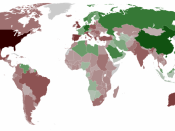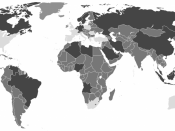"Because each nation's balance of payments equals zero, it follows that there is actually no significance to a balance of payments deficit or surplus." Discuss.
Executive Summary
Macroeconomic is concerned with the overall performance of the economy. Macroeconomic did not even exist in its modern form until 1936, when John Maynard Keynes published his revolutionary theory. In his theory Keynes developed an analysis of what causes business cycles, with alternating spells of high unemployment and high inflation. Today, macroeconomics examines a wide variety of areas, such as how total investment and consumption are determined, how central banks manage money and interest rates, what causes international financial crisis, and why some nations grow rapidly while other stagnate. Although macroeconomics has progressed far since first insights, the issues addressed by Keynes still define the study of macroeconomics today.
A country's balance of payment account records all transactions between the residents of that country and the rest of the world.
These transactions enter as either debit items or credit items. The debit items include all payments to other countries: these include the country's purchases of imports, the spending on investment it makes abroad and the interest and dividends paid to people abroad who have invested in the country. The credit items include all receipts form other countries: from the sales of exports, from inward investment expenditure and from interest and dividends earned from abroad. (John Sloman, Essentials of Economics, page 462-265)
The sale of exports and any other receipts earn foreign currency. The purchase of imports or any other payments abroad use up foreign currency. If we start to spend more foreign currency than we earn, one of two things must happen. Both are likely to be a problem.
The balance of payments will go into deficit. In other words, there will be...


